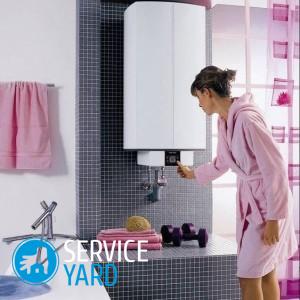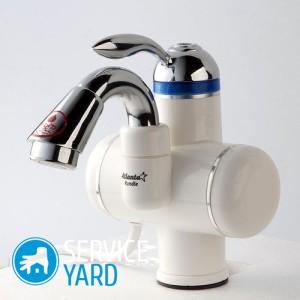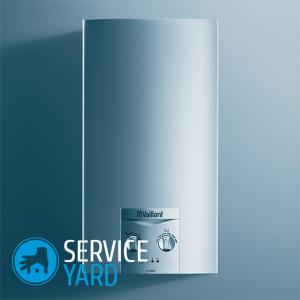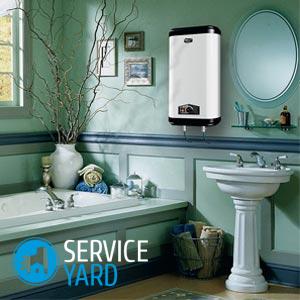Water heater - flow or storage?
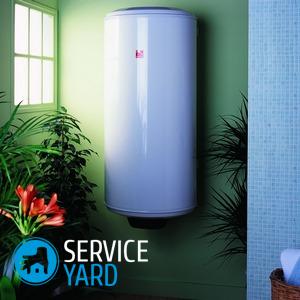
Today, the presence of hot water in the house is not a luxury, but a vital necessity. By and large, residents of megacities do not face the problem associated with the lack of warm water, but in the villages this happens quite often. Therefore, the urgent question is which heater - flowing or storage, is better. Since the device will be used daily, the criteria for its selection are quite stringent. To understand this, you need to know the principle of operation, all the advantages and disadvantages of both types of devices.
to contents ↑Types of Water Heaters
Modern electric water heaters come in two types:
- Flowing;
- Cumulative.
They are great for country houses and cottages, as well as for urban apartments.
Important! Devices are very popular, primarily because of the simple installation, which does not require any documentary permissions, and reasonable cost.
Units are able to fully provide the house with hot water, but in their design and principle of operation they differ from each other.
to contents ↑Accumulative water heater
The device is a container of a certain volume into which cold water is supplied from the water supply system. The tank is covered with a layer of thermal insulation.
The principle of operation of the storage water heater
A device of this type works quite simply:
- The cold water that has accumulated in the tank is heated to the set temperature by the built-in electric heater, and the thermostat monitors the maintenance of the temperature selected by the consumer.
- The required temperature indicator is set manually, by turning the knobs, when it is reached, the thermostat turns off the power supply of the heater.
- Due to the insulation of the tank, the water retains its temperature for a long time (effect of a thermos).
- As soon as the water temperature starts to drop, the thermostat automatically turns on the heating element, and the water is again heated to a predetermined level.
- Despite the large dimensions of the tank, the storage water heater in the interior looks quite aesthetically pleasing. In our separate article you will find recommendations, how to hang a water heater on a wall.
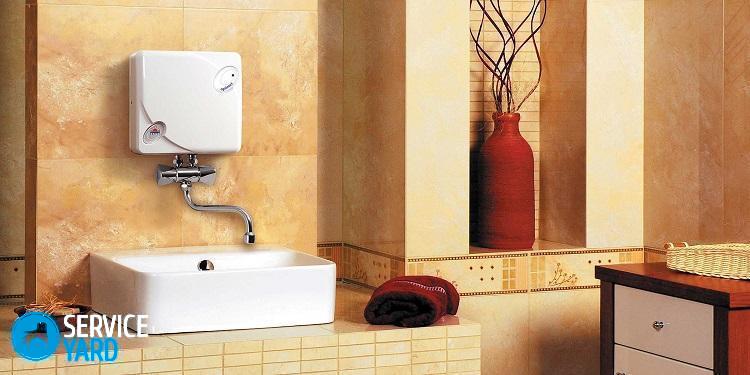
Advantages of a storage water heater
Water heaters of this type are by far the most popular among consumers. And this is not strange, since the devices have undeniable advantages:
- Easy to install and connect. In order for the device to start working, it is enough to have a working electrical outlet with ground in the room.
- The ability of the unit to maintain a large amount of water for a long time at the desired temperature regime - due to the thoughtful thermal insulation of the storage tank.
- The ability to simultaneously service multiple water points (for example, you can use hot water in the kitchen and in the bathroom at the same time).
- A wide selection of design and device shapes.
Follow the link to understand the question.“Accumulative water heater - which company is better?”
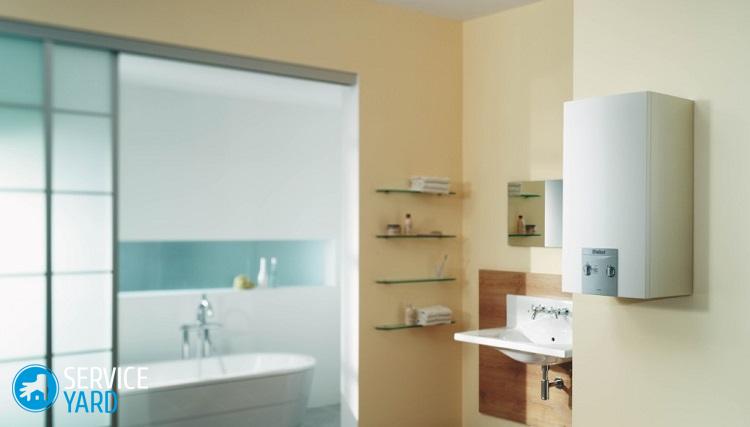
Disadvantages of a storage water heater
However, such heaters are not suitable for everyone. Consider the disadvantages of such a system:
- Dimensions of the device.For a family of two people, for a comfortable use of warm water, a tank of at least 50-80 liters is needed. And if the family is larger, then you should consider options for a heater with a capacity of 100 liters or more. Naturally, such a tank size takes up a lot of space and needs reliable fastening.
- With the consumption of the entire supply of hot water from the tank, in order to have warm water in the house again, it is necessary to wait about 15-20 minutes to heat a new one.
- This type of water heater uses electricity to maintain the required water temperature, even if you do not consume water.
- Such devices require periodic cleaning, since when water is heated to the bottom and the walls of the tank, various precipitation occurs, scale forms, which leads to a decrease in the productivity of the device.
Important! Carrying out preventive cleaning, it is necessary to replace the magnesium anode.
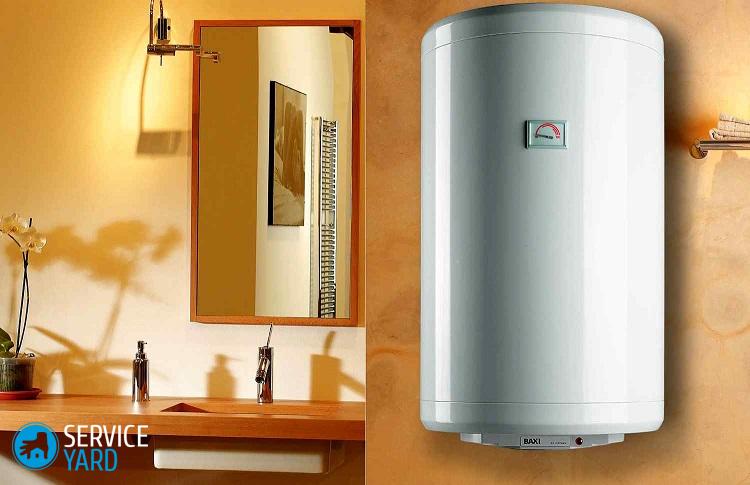
to contents ↑Important! If you opted for a storage water heater and want to connect it yourself, without waiting for the master’s visit, be sure to read in a separate review, how to connect a storage water heater in an apartment.
Instantaneous water heater
A flowing boiler is another alternative source of hot water that can be used both in enterprises and in apartments.
Important! On our site of useful tips there is all the information with which you will choose the best instantaneous electric water heater.
The principle of operation of the flow heater
Such a device works on the principle different from the storage device:
- Such an electric heater carries out heating of water to the desired temperature very quickly (10-15 seconds), due to the presence of very powerful electric heating elements.
- Cold water comes from the water supply, passes through the heating elements and is heated to the desired temperature.
- The inclusion of the required number of heating elements is controlled by flow sensors. The flow increases - a larger number of elements are triggered, the flow decreases - there are fewer working heating elements. This somewhat reduces the cost of electricity that is used to heat water.
- The devices are equipped with special protection against overheating, which, when the temperature is above the limit, turns off the heating elements. This eliminates the risk of burns.
- Like storage models, flow models have protection against pressure increase. It prevents mechanical breakdowns in the event of pressure surges, and boiling water while reducing its flow rate through the heater.
- Modern instantaneous water heaters have an electronic type of control with the conclusion to the display of all the necessary information. The following parameters may be displayed:
- Water temperature;
- Power of electric heating elements at the moment;
- Current water consumption (liters per minute).
- Also, flow-type heaters can have an additional light indication, which signals the excess of the water temperature of the selected value.
- A better and better instantaneous water heater is equipped with a remote control.
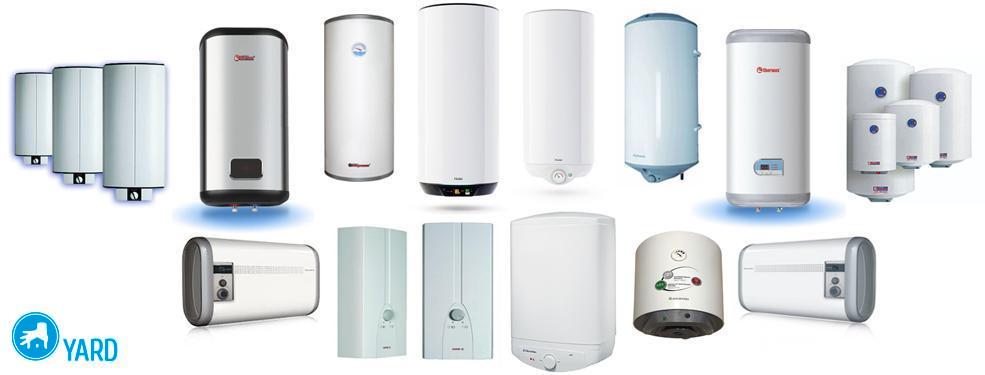
Advantages of a flowing water heater
The undoubted advantages of instantaneous water heaters are:
- An opportunity to use hot water without restrictions on quantity and time. Water will be heated as long as it is necessary for the consumer.
- The small size of the device allows you to place it in a convenient place. Since the unit does not have a large capacity tank, it can be installed not only in the bathroom or boiler room, but also in the kitchen.
Important! The wall for fastening the instantaneous water heater does not have to be selected as a carrier.
- More aesthetic, when compared with storage boilers, the appearance of the device.
- Minimum maintenance is required. It does not need to be cleaned periodically, as is the case with a storage device.
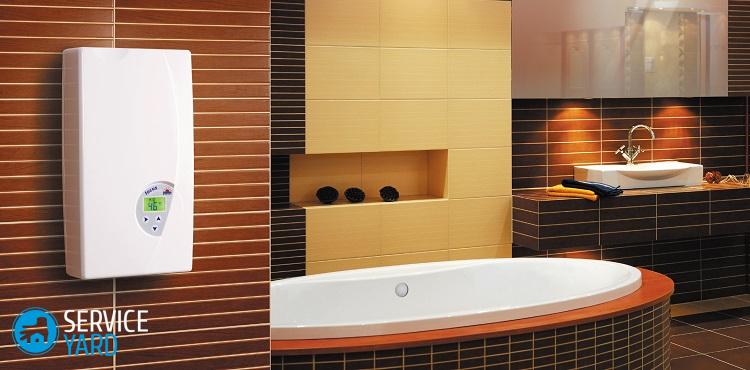
Disadvantages of a instantaneous water heater
This device also has disadvantages, which in some cases play a decisive role in the question of which is better - a boiler or instantaneous water heater:
- High power of the device means a large consumption of electrical energy.
- As a rule, flow units have a power of 8-10 kW to several tens, so for their installation, laying of a reinforced cable from the access panel is required. It is also recommended to install circuit breakers during installation.
Important! In a conventional apartment outlet, you can turn on electrical appliances whose power does not exceed 2 kW. Before buying a instantaneous water heater, make sure that the power grid in your home allows you to connect such electrical appliances.
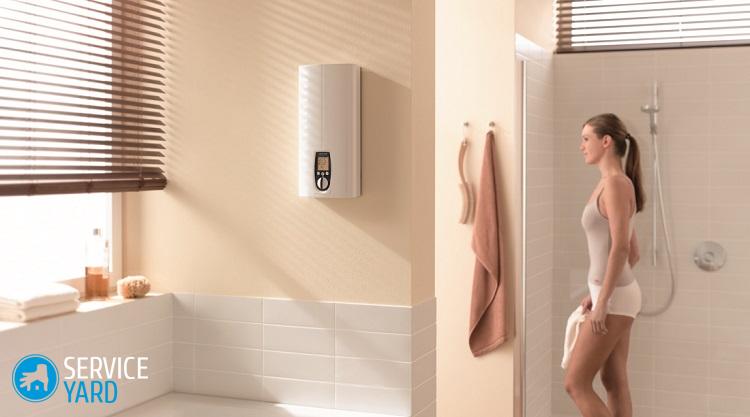
Which water heater to choose - flow or storage?
So, which is better - a storage or instantaneous electric water heater? Which device should I prefer - with a volumetric tank or a small but powerful device?
Here you should build on your needs, goals of use and capabilities:
- If you plan to use the device from case to case and anticipate a small flow of water, it is better to purchase a small-capacity flowing or storage boiler (up to 20 l).
- If the water heater will be used only during annual water outages in order to carry out preventive maintenance on the water main (from 2 weeks to a month 1-2 times a year), then it is advisable to buy a capacitive heater with a tank of 50-80 liters - for 1-2 people, and a tank of 80-100 liters - for a larger family.
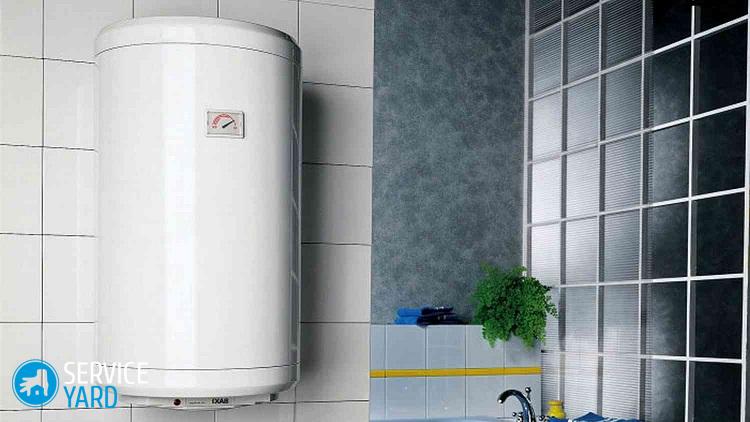
What is better in terms of efficiency - a water heater or a boiler?
To determine which is more economical - a flowing water heater or boiler, it is necessary to take into account not only the cost of the device, but also the energy consumption during operation:
- Regarding the price of the device, flow-type units that do not have additional functions and have a capacity of up to 6 kW are inexpensive. And if you compare them with storage devices, then in this case they win.
- If you choose more powerful instantaneous water heaters with greater functionality, then their cost will far exceed the cumulative analogues.
Important! The cost of the storage boiler to a large extent depends on the material of manufacture of the water tank, its volume, the coating material of the inner walls of the tank and the design of the device.
- Regarding the consumption of electric energy, approximately the same amount is consumed to heat the same volume of water to the same temperature.
Important! There is an opinion that if there is a powerful heating element in the flow-through type device design, the consumption of electric energy is greater than that of the accumulative one. However, relying on the laws of physics, we can safely say that this is not so. For example, to heat water with a volume of 1 liter to 100 degrees, 4200 kJ (1,167 kW) is required, regardless of how the heating is carried out.
- It is worth considering the fact that the flow unit stops consuming electricity immediately after the valve is closed, while the storage unit, even in the “standby” mode, continues to consume electricity, maintaining the set temperature of the water in the tank. Therefore, we can assume that in terms of efficiency, the best water heater is a flowing electric one.
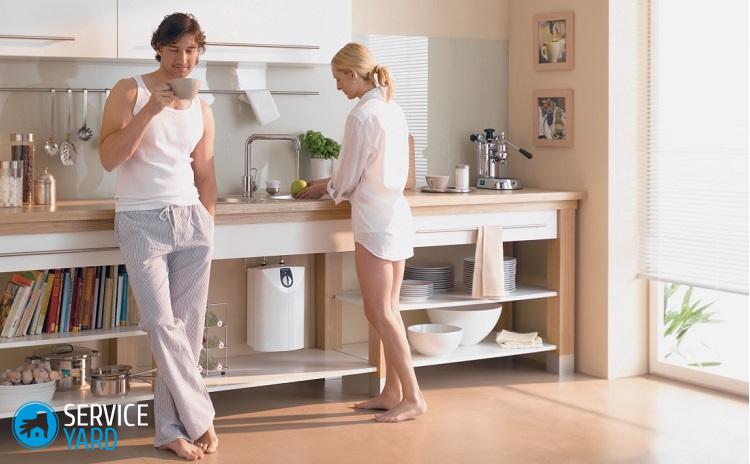
Based on the foregoing, we can conclude:
- Although the flow-through device is more economical in terms of paying utility bills for electricity, it is compact, lightweight, but requires special skills when connecting it. It’s hardly possible to do without professionals.
- Storage devices are more bulky, require only a reliable and strong wall for installation, and in the absence of water flow they continue to consume electrical energy.
to contents ↑Important! If you have the opportunity to use gas rather than electricity, get expert and user opinions on the subject, which is better to choose - a boiler or a geyser.
Stock footage
Knowing this and taking into account the needs of your family, you can easily choose a flow or storage water heater with the necessary parameters. Which instantaneous water heater is better and regarding the quality of the boiler can be suggested by an experienced consultant in a plumbing store.





